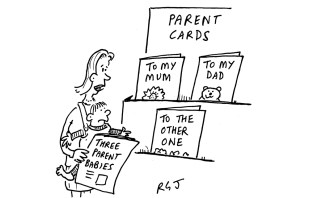A much cited statistic of the modern era reminds us time and again that at some point in our lives one in two of us will get cancer. So routinely is this doled out that its repetition must surely have dulled the threat somewhat – until, of course, we become the one in the two.
When chemotherapy leads to virulent mouth ulcers, Patterson reaches for onomatopoeia: ‘Aieeoo’
In 2019, this statistic took on new emphasis for Sylvia Patterson. Then a 54-year-old pop music journalist clinging on for dear life in an industry going the way of the dodo, she discovered a curious leakage around her right nipple. Doctors confirmed Google’s scaremongering – breast cancer – then mollified her in the way doctors do, assuring her that its early detection was a good thing. Nevertheless, she was facing chemotherapy, and very likely a mastectomy.
That statistic, then, like the scars to follow, would mark her for life. In Same Old Girl, she dissects this new reality with an attention to detail she might once have afforded a cover feature with the Spice Girls. But, as with her first memoir, I’m Not With the Band, which detailed her 30 years at pop’s crumbling coalface, she brings much rackety humour to bear, despite the gravity of the subject: ‘My personal, bespoke, especially-for-you type of breast cancer is HER2 Positive, which sounds like a troubled trans-woman’s self-empowerment workshop.’ But within weeks, the funny threatens to desert her, as she enters more fully into the arena of the unwell:
Lying face down on the hospital bed, my breasts dangle like exhausted udders into specially moulded, bosom-shaped holes. There is no dignity in this ‘lark’, and humiliation, already, has become a way of life.
Much of this territory will, of course, be familiar to anyone even passingly au fait with the illness memoir, a genre that’s perpetually in vogue. We’ve an endless fascination, it seems, in observing how others cope when health is abruptly compromised – as do, presumably, the people who write them. But it’s little wonder why they do it: this really is the defining story of their lives. What else could compete?
These memoirs tend to be well-received, too. When the actor Joe Tracini, the son of the TV comedian Joe Pasquale, wrote one last year about a borderline personality disorder so severe that he regularly contemplates suicide, he suggested that ‘it would take a special kind of prick to have a pop at me when I’m talking about this stuff’. He’s right: in many ways, the illness memoir is critic-proof. How can you possibly kick anyone when they’re already down?
But then it does tend to bring out the most stirring writing, revealing much previously concealed mettle from even the most vulnerable of authors. Patterson, who has always been anything but, employs coping mechanisms that are unambiguously stoic. Cancer, she is adamant, will not change her; her trademark humour will ultimately out. And so when chemo prompts virulent mouth ulcers, she reaches for onomatopoeia: ‘Aieeeoo’. When she endures life-threatening constipation and is in such bowel pain that she finds herself inserting a finger in an (ultimately vain) attempt to relieve the pressure, she does likewise: ‘Grooo!’ When she loses her pubic hair, ‘it’s barely there, at best a sorry combover like Archie Gemmill’s in the Scotland football team in 1978’. Very quickly you realise that this isn’t an ordinary illness memoir. It’s hardly a hoot, granted, but you do laugh.

She endures the multiple indignities of her treatment not necessarily by keeping calm, but certainly by carrying on. She manages to ghostwrite a book (the memoir of a close friend of Amy Winehouse) between pandemic-compromised hospital visits, and also to keep the relationship with her long-term partner alive, no longer in the bedroom – libido flatlines – but rather the nearby park with cans of Strongbow, where they take appreciative stock of their enduring union.
The very existence of this book will tell you that Patterson lives. Cancer doesn’t kill her. Towards the end, when in remission and bewildered by the bounceback, she rekindles old friendships, and devotes an entire chapter to the thrill of having a new kitchen fitted. Awed by the fact she’s been given some extra time, she endeavours to make the most of it. The chic new hob works wonders.
At one point she jokes that youth is wasted on the young. But clearly it isn’t: Patterson lived vigorously throughout her youth, as many of us do. It was having led such a full life that helped her with this wretched middle-aged battle, which she has faced down with bravery, determination and much gallows humour. Her book is a middle finger to cancer, a tribute to dogged survival. Difficult not to salute her.






Comments